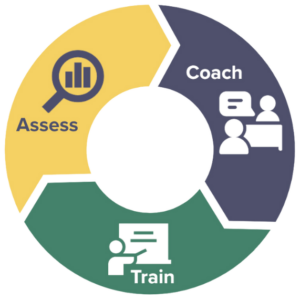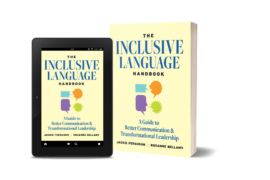If you belong to a marginalized or underrepresented group, there’s a good chance you’ve been asked to comment on sensitive issues that affect you personally. For people of color, this might take the form of White friends asking you, “When did things get so bad?” For those who identify as nonbinary, it might be cisgender colleagues asking, “So, what do your pronouns mean?” These questions often come from well-meaning people who are trying their best to understand but inadvertently make you feel uncomfortable.
As tough conversations about social issues become increasingly common in the workplace, it’s important that those asked to engage know how they can navigate these moments in a way that feels safe and comfortable. In this article, we’ll hear from two people with a great deal of experience navigating this side of the conversation.
Know Your Limits
Engaging in tough conversations as a marginalized or underrepresented person takes patience and emotional labor. If you don’t feel capable of giving that, it’s always fine to say no or decline to engage. That’s a move at which Jackie Ferguson, The Diversity Movement’s Head of Content and Programming, is particularly adept. A writer, Certified Diversity Executive, and long-time advocate for social equality, Ferguson is multiracial and grew up in a multi-generational, cross-regional household, so she’s had plenty of hard conversations with people of different lived experiences.
“After 5 or 10 or 20 conversations, it gets to be a lot,” she says. “As a Black person, it’s a relief to see so many people finally realizing the extent of the problem. But, it gets to be exhausting when every White person you know is saying, ‘How are you doing? Do you want to talk about it?’”
It can be hurtful to know that the struggles you’ve faced your whole life — and watched family members and friends face too — are only now becoming mainstream conversations. “It’s frustrating to see so many people just now realizing this is a problem,” Ferguson says. “Black and Brown people have seen this occur in their personal lives for so long that there’s a little bit of cynicism. Are these conversations going to change anything? Why do I have to keep reliving it if there’s not going to be a change?”
If you’re feeling cynical, tired, or otherwise unwilling to engage in tough conversations, that’s okay. Understand when you feel comfortable and engaged to have these conversations and communicate when you don’t. “But recognize that we all have to do this work to make sustainable and meaningful change,” says Ferguson. “We also have to be allies to those getting on this journey. When you change one perspective, how far does that reach? Children, colleagues, and communities can be affected positively when you plant seeds in one heart. Together, we can make strides forward by learning to communicate and having empathy for one another.”
Make Sure You’re Ready to Engage
While some people prefer not to engage in these conversations, others are passionate about educating others. The Diversity Movement’s Head of Consulting, Dr. Florence Holland, offers one perspective: yes, engage, but do so with ground rules. As a DEI leader with over 15 years of expertise and hands-on experience, Dr. Holland says she enjoys having the opportunity to educate others, regardless of where they are in their DEI journey. After engaging in many tough conversations through her work, Dr. Holland has set two firm ground rules for navigating them in a healthy, productive way:
1) Suspend your right to be offended.
“For the purpose of growth and knowledge, we have to enter these conversations with a suspension of offense,” she says. “If we go in looking to find something wrong with everything the other person says, the conversation isn’t going to go anywhere.”
Dr. Holland says she recognizes how hard this can be and how many people aren’t in a place — mentally and emotionally — to suspend their right to be offended. “If you’re not in that place, then maybe you’re not the right person to have that conversation with,” she says. “And that’s fine. If you can refer them to someone else or to a helpful resource, that’s great.”
What she doesn’t want is to stop someone’s progress along their DEI journey by scaring them off with a conversation that turns combative and defensive. “We have to be in reflective, humble listening mode,” says Dr. Holland. “During these conversations, I use a lot of expressions like, ‘What I hear you saying is…’ or, ‘I understand that’s your intent, but think about it this way.’”
2) Remember that everything is not a marchable offense.
“It’s about picking your battles,” says Dr. Holland. “In such a tense political climate, a lot of us are ready to go on the defensive at every careless remark. But you have to give people some grace to let themselves grow.”
She’s noticed that some people don’t speak out on important issues because they’re afraid of saying the wrong thing. “We have to be patient as we’re educating people on diversity and inclusion,” she says. “They’re not always going to get it right the first, second, or third time. But if the other party is ready to march at every offense, then it’s going to shut down the conversation.”
The workplace isn’t like social media; you can’t just unfollow or block someone after a heated disagreement. “At the end of the day, I’ve still got to work with you tomorrow,” Dr. Holland says. “That’s why it’s important to approach these conversations with empathy and understanding.”
Being reminded of the issues that affect your community is never easy, but tough conversations can be a great learning opportunity for everyone involved. To learn more about the other side of this dialogue, check out our article on “Approaching Tough Conversations as an Ally.”
To gain additional perspectives and guidance along your personal DEI journey, contact us.














